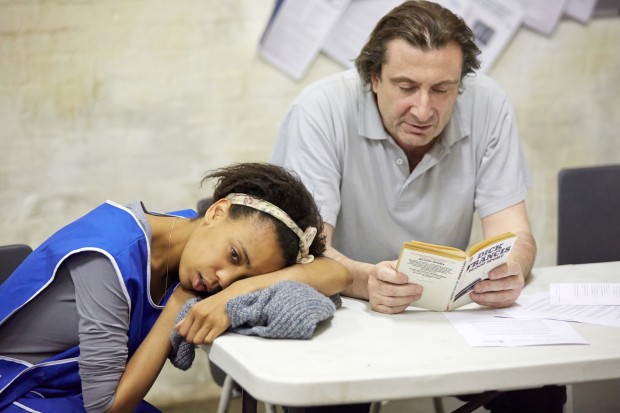You have no items in your cart. Want to get some nice things?
Go shopping
The Yard Theatre is a converted warehouse building in the Queen’s Yard at Hackney Wick, a sparse, graffiti-strewn industrial area sprawling in the shadow of Anish Kapoor’s grandiose ArcelorMittal Orbit. From this rather unsuspecting corner of East London, The Yard has been supporting artists to create new work since 2011 through a process of open submissions at particular points in the year. Their current show, Beyond Caring, directed and devised by Alexander Zeldin, is the first show that has been commissioned especially for this space and marks the beginning of a new creative phase for The Yard. Judging from the standard of this first commission, this is exciting news for theatre in London.
From the moment you enter the theatre via the café bar, you feel suddenly, unnervingly transported away from the bohemian craft beer crowd by Natasha Jenkin’s set design. The stage area of this crude ampitheatre is filthy, sparsely furnished with standard-issue plastic break-room table and chairs. A pin board is affixed to the grubby back-wall with corporate charts and notices pinned scrappily to it (an instantly recognizable feature of company break rooms). Climbing up into the fully raked seating area and settling awkwardly into the reclaimed plastic chairs, I can really appreciate how appropriately the setting of this play, and its subject matter, responds to its location.
Beyond Caring focuses in on the lives of four people who work the night shift as cleaners in a meat factory. In the moments I sat waiting for the performance to begin I reflected on the significance of the meat factory: a place where once living creatures are pulled apart, reduced to their component parts, reassembled into palatable portions for consumer use.
The four cleaners are on zero-hours contracts; three of them temporary agency staff, only one permanent. The work is physically intensive and taxing for all of them, especially for 27-year-old Grace (charmingly portrayed by Janet Etuk) who is visibly suffering from rheumatoid arthritis despite having recently been signed off benefits for being “fit to work”. They are treated quite like sausages; literally in a sausage factory. Every few hours they have an allocated break, presided over by the manager, a young man called Ian (Luke Clarke), whose hard-nosed attitude on the job betrays an ultimately quite sad character — you can’t help but feel for him.
The real success of this play is a tribute to the masterful portrayals from the whole cast. These characters are all surviving day by day under difficult conditions that are never fully revealed to us and yet we feel their anguish through the actors’ careful but pained body language and discreet yet heartfelt expressions. I was charmed at times, and utterly gripped throughout.
Each performance deftly balances the exterior and interior lives of the characters with great pathos even with limited dialogue and several drawn-out silences. Phil (played by Sean O’Callaghan) is an introvert, choosing to hide his face in a book, but also demonstrates a longing for emotional connection. Becky (Victoria Moseley) is abrupt, angry and scrappy; she also appears restless and desperate. Susan (Hayley Carmichael) is clearly downtrodden. Throughout the play we witness glimmers of her resilience, optimism and hopelessness, heartbreakingly portrayed by Carmichael.
The sound design is for the most part sparse, but it shoots in abruptly; short, sharp and loud, emphasising the seething tension that lies beneath the surface of these people’s lives. But it was the subtly evoked emotions from the actors that drew me in deeply, inviting me to empathize with their characters, rather than merely pitying them. There are moments of irony and a bleak humour in the narrative that increased my warmth towards the cleaners, and which provoked a warm laughter from the audience.
In one scene, manager Ian, whose dialogue is peppered with corporate management speak, attempts to explain his philosophy on life to the others. “I am my own god,” he declares, tentatively. Ian’s form of “spirituality” exemplifies a certain individualistic approach to life-fulfillment, an attitude described by Roman Krznaric as the “Age of Introspection” in his recent book Empathy: A Handbook for Revolution – an approach which defined the latter decades of the twentieth century. For Ian such individualism does not result in the great outcomes that it promises. From his book, Krznaric argues that it is “outrospection”, the emotional capacity to empathise with others, that is “an antidote to the self-absorbed individualism that we have inherited from the last century”. The results of which could spark social, and even political change.
Empathy is now acknowledged scientifically as an essential ingredient of human wellbeing, but it takes work; we can only appreciate the lives of others to the extent that we can establish a connection with them. We also have to be prepared to make an “imaginative leap”, shedding certain established prejudices in the process (like, for example, the popular opinion of people on the benefits system). Krznaric emphasizes the importance of art and of storytelling to the foundations of empathy. To this end he has established The Empathy Library for sharing books and films to inspire a global empathy revolution. Beyond Caring is my recommendation for this library, for the way it carefully lifts the lid on an otherwise rarely seen, much discussed but far-less-understood invisible working class.
I am unsure about this term “invisible”, taken from the Yard Theatre’s own promotion for this play. Surely something is only deemed really invisible or visible from a given, privileged perspective. As I get up and leave the theatre after this spellbinding performance, I feel that somnambulant state that Roland Barthes thought characterized the cinema audience; a bit bewildered, a little awkward, as if waking from a dream, my own reality, slightly fuzzy, fused with something else. As I wander past the graffiti-covered walls back towards the Tube station, I begin to notice the hypnotic, repetitive sound of heavy-duty machinery drifting over from a nearby building. From the station platform I gaze down at a street sweeper glowing high-vis yellow in the dusky light, brushing the crannies of the road with a broom, slowly stalked by a truck with flashing orange light; hardly invisible, not in this moment at least.

About Becky Ayre
Becky is a writer, editor and researcher of visual arts and the environment. She lives in Oxford. She works collaboratively with Inheritance Projects—a small group of independent curators and researchers that organise exhibitions, events, new commissions, publications and research projects. She blogs at Atmospheres of Uncertainty.




